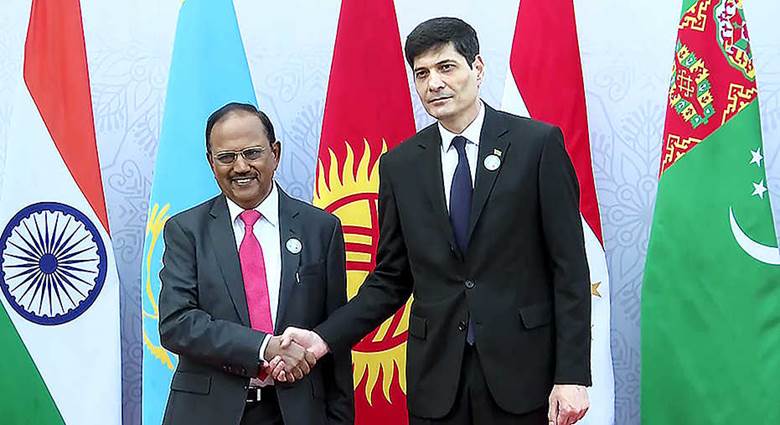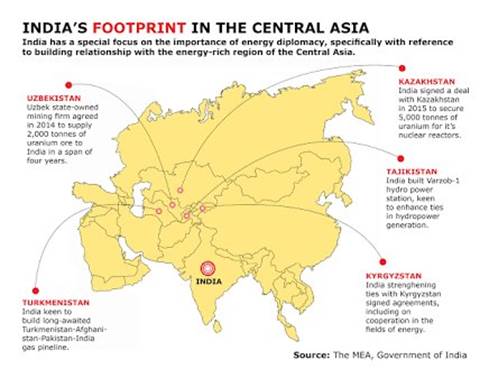Description

Copyright infringement is not intended
Context: Curbing terrorism and terrorist financing in Afghanistan, and the use of trade and connectivity routes via Iran are key to regional security, said India as National Security Adviser (NSA) Ajit Doval chaired the first India-Central Asia meeting of NSAs and Secretaries of Security Councils in Delhi.
Details:
- The day-long meeting, which was the outcome of the India-Central Asia virtual summit held in January this year, where Prime Minister Narendra Modi hosted leaders of Kazakhstan, Kyrgyzstan, Tajikistan, Turkmenistan and Uzbekistan and agreed to have security chiefs meet on a regular basis to discuss India’s “extended neighbourhood”.
- The Security Advisers discussed the current situation in Afghanistan and its impact on the security and stability of the region, reiterating strong support for a peaceful, stable and secure Afghanistan, emphasising respect for its sovereignty, unity and territorial integrity and urging non-interference in its internal affairs

Copyright infringement is not intended
Key outcomes of earlier summit:
- “Delhi Declaration” joint statement: To develop mutual connectivity for enhanced trade and commerce between India and Central Asian countries.
- Proposed a number of high-level exchanges, including bi-annual summits, and annual meetings of the Foreign, Trade and Cultural Ministers and Secretaries of Security to “strengthen cooperation in the areas of political and development, partnership, trade and connectivity, culture and tourism and security”.
- Adopted a plan to build a “Central Asia Centre”in New Delhi.
- Announced two “Joint Working Groups”(JWGs) on Afghanistan and the Chabahar port
- Stressed on resuming TAPI gas pipeline projectthat has run into issues over India-Pakistan tensions and the situation in Afghanistan.
India-Central Asia Relations:
- Ties between India and Central Asia are based on a foundation of “deep historical, cultural and civilizational links.”
- India and Central Asia has close trade and cultural linkages since the Indus valley civilization.
Why Central Asia should matter to India?
- Geo-political importance: Central Asia serves as a land bridge between Asia and Europe, and is rich in natural resources. Its geopolitically axial offers whole range of opportunities.
- Geo-economic importance: This region is rich in natural resources like crude oil, natural gas, gold, copper, aluminum, and iron. It can help India in securing energy security.
- Geo-strategic importance:This region is located close to the conflict prone area of West Asia and Afghanistan. Although Central Asia doesn’t share borders with India but there are very high chances of spreading out of security threats i.e. terrorism, narcotics trafficking and arms smuggling from this region.
.jpg)
What are the areas of cooperation between India and central Asia?
- Energy security:India launched the civil nuclear cooperation with Kazakhstan to ensure supply of nuclear fuel to Indian nuclear plants. The TAPI project is connecting energy rich Central Asia with energy starved South Asia.
- Economic Trade:India’s trade with the five Central Asian Republics—Kazakhstan, Uzbekistan, Turkmenistan, Kyrgyzstan and Tajikistan—was around $ 2 billion in 2018.
- Peace and security: India and Central Asian countries have a shared interest in the stability of Afghanistan and counter-terror initiatives.
- International cooperation: India's full membership into the Shanghai Cooperation Agreement (SCO) opens up an opportunity for a closer engagement with region but New Delhi still lacks a political-strategic clarity.
- Development cooperation: India provides Lines of Credit to finance development and manufacturing projects in Central Asia.
- Diaspora:The “people-to-people” contact has been a defining feature of India’s Connect Central Asia Policy. Indian cultural diversity has been extremely popular in the region.
Measures taken by India to boost relations:
- Strategic Partnership Agreements (SPA):India provided financial aid to the region and established diplomatic relations. New Delhi signed the Strategic Partnership Agreements (SPA) with Kazakhstan, Tajikistan and Uzbekistan to stimulate defense cooperation and deepen trade relations.
- Connect Central Asia’ policy:It was adopted in 2012 to boost political cooperation, economic cooperation, strategic cooperation, regional connectivity, information technology (IT), cooperation in education, people-to-people contact, medical cooperation, and cooperation in regional groupings.
- International North-South (Transit) Corridor (INSTC): INSTC is a multi-mode network of ship, rail, and road route for moving freight between India, Iran, Afghanistan, Armenia, Azerbaijan, Russia, Central Asia and Europe. It was adopted for cutting the costs and time in moving cargo between Russia and India.
- Chabahar port: India and Iran are developing the Chabahar port to serve as an alternate route to Central Asia.
- Ashgabat agreement: India joined the Ashgabat agreement for developing the shortest trade route between the Central Asian republics and Iranian and Omani ports.
- TAPI (Turkmenistan-Afghanistan-Pakistan-India)project adopted to connect an energy-rich Central to South Asia.
.jpg)
Major challenges in India-Central Asia relations:
- Geographically inaccessible: India has traditionally attached great importance to its relations with Central Asia. But, unfortunately, the relationship faces constraints due to lack of direct access to Central Asia.
- Lack of policy:There is no specific Indian diaspora policy in Central Asia, as the number of Indians in Central Asian Republics (CARs) is quite less.
- Unstable situation in Afghanistanand a problematic India-Pakistan relation.
- China presence:China has made considerable inroads into the region through its Belt and Road Initiative and its boosting trade with Central Asian states. Growing axis of Russia-China-Pakistan would limit India’s presence in Central Asia.
- US sanctions on Iran: India has been taking renewed interest in enhancing its strategic presence in Central Asia, but U.S. sanction on Iran makes it difficult for India to capitalize various opportunities and potentials.
Way forward:
- India needs to use the economic leverages more efficiently to build closer ties with Central Asia.
- In the backdrop of joining the Ashgabat Agreement, India now must enlarge the strategic role of Chabahar port for evolving an integrated transportation network involving both the INSTC and the proposed transit corridor to Central Asia.
- Importance of Central Asia for India is not merely civilizational and historical; it goes much beyond this.
https://epaper.thehindu.com/Home/ShareArticle?OrgId=GTBAJPNCL.1&imageview=0







.jpg)






